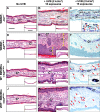Evidence that vitamin D(3) promotes mast cell-dependent reduction of chronic UVB-induced skin pathology in mice
- PMID: 20194632
- PMCID: PMC2839149
- DOI: 10.1084/jem.20091725
Evidence that vitamin D(3) promotes mast cell-dependent reduction of chronic UVB-induced skin pathology in mice
Abstract
Mast cell production of interleukin-10 (IL-10) can limit the skin pathology induced by chronic low-dose ultraviolet (UV)-B irradiation. Although the mechanism that promotes mast cell IL-10 production in this setting is unknown, exposure of the skin to UVB irradiation induces increased production of the immune modifying agent 1alpha,25-dihydroxyvitamin D(3) (1alpha,25[OH](2)D(3)). We now show that 1alpha,25(OH)(2)D(3) can up-regulate IL-10 mRNA expression and induce IL-10 secretion in mouse mast cells in vitro. To investigate the roles of 1alpha,25(OH)(2)D(3) and mast cell vitamin D receptor (VDR) expression in chronically UVB-irradiated skin in vivo, we engrafted the skin of genetically mast cell-deficient WBB6F(1)-Kit(W/W-v) mice with bone marrow-derived cultured mast cells derived from C57BL/6 wild-type or VDR(-/-) mice. Optimal mast cell-dependent suppression of the inflammation, local production of proinflammatory cytokines, epidermal hyperplasia, and epidermal ulceration associated with chronic UVB irradiation of the skin in Kit(W/W-v) mice required expression of VDR by the adoptively transferred mast cells. Our findings suggest that 1alpha,25(OH)(2)D(3)/VDR-dependent induction of IL-10 production by cutaneous mast cells can contribute to the mast cell's ability to suppress inflammation and skin pathology at sites of chronic UVB irradiation.
Figures





References
-
- Alard P., Niizeki H., Hanninen L., Streilein J.W. 1999. Local ultraviolet B irradiation impairs contact hypersensitivity induction by triggering release of tumor necrosis factor-alpha from mast cells. Involvement of mast cells and Langerhans cells in susceptibility to ultraviolet B. J. Invest. Dermatol. 113:983–990 10.1046/j.1523-1747.1999.00772.x - DOI - PubMed
-
- Boonstra A., Barrat F.J., Crain C., Heath V.L., Savelkoul H.F., O’Garra A. 2001. 1α,25-Dihydroxyvitamin D3 has a direct effect on naive CD4+ T cells to enhance the development of Th2 cells. J. Immunol. 167:4974–4980 - PubMed
Publication types
MeSH terms
Substances
Grants and funding
LinkOut - more resources
Full Text Sources
Other Literature Sources
Molecular Biology Databases

